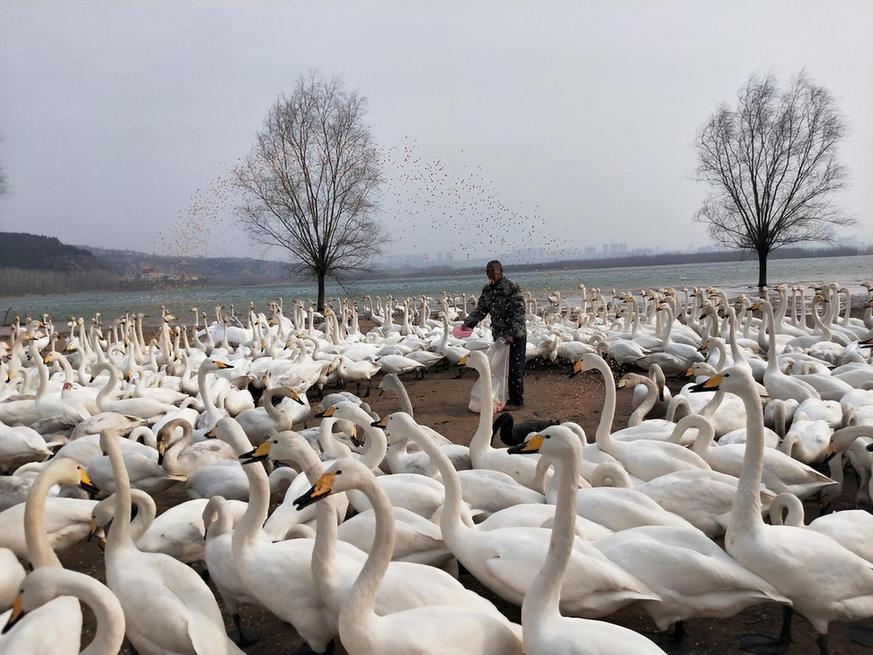'Swan father' waves goodbye to winter flock

He Jianxi feeds swans wintering in the Sanwan Yellow River Wetland Park in Pinglu county, Shanxi province. YANG PEIPEI/FOR CHINA DAILY
Protection money
Shanxi provincial authorities have issued special instructions and provided strong support for the protection of migratory birds in a bid to make Pinglu a safe haven for the birds. The county government has also strengthened protection of the wetland.
It has spent 630,000 yuan ($96,900) every year since 2014 to subsidize farmers living near the wetland to return grain plots to wetland and to buy patrol boats.
A total of 20 million yuan has also been invested in expanding forest near the wetland by 167 hectares to create more habitats for the swans.
The Yellow River wetland administrative department has compensated the farmers for their losses in agricultural production due to the wetland protection projects.
The migratory swans first came to Pinglu in the 1970s. Initially, farmers thought of them as pests, but they later learned to accept them.
Li Xiaoping, head of the wild animal protection station of the Pinglu forestry bureau, said farmers are now leading efforts to look after the wild birds.
The number of swans wintering in Pinglu has increased from less than 100 in the beginning to tens of thousands today.
"There is a consensus on protecting swans among local residents," Li said. "Since I took over the post in 2002, there has not been a single incident of hurting or poaching the swans. They are like our close neighbors."
He Jianxi is happy when visiting photographers tell him the wetland park is the only place in the country where people can watch wild swans on such a large scale at close range.
"It is because the swans have built up their trust in local residents," He said, adding he is proud of his role in cultivating that trust.
The swans have attracted large numbers of onlookers, and fueled a boom in the catering and tourism industries.
However, He is aware the swans are only transient visitors. "Spring came early this year so the swans left early. Little Red Neck departed on Feb 18," he said.
As of early last month, almost all the swans had left to fly north. But He is already counting down the days until his "children, neighbors and friends" return for their winter sojourn "safe and sound".
|<<Previous12
[ Editor: GSY ]




More From Guangming Online
Medics from Fujian leave for Shanghai to aid in battle against COVID-19 resurgence
New int'l land-sea transport service to Indo-China Peninsula launched
Another makeshift hospital under construction in Shanghai
Tourists view tulips in Suiping County, Henan
In pics: blooming gagea flowers on grassland in Zhaosu, Xinjiang
Greek workers stage 24-hour general strike over high prices